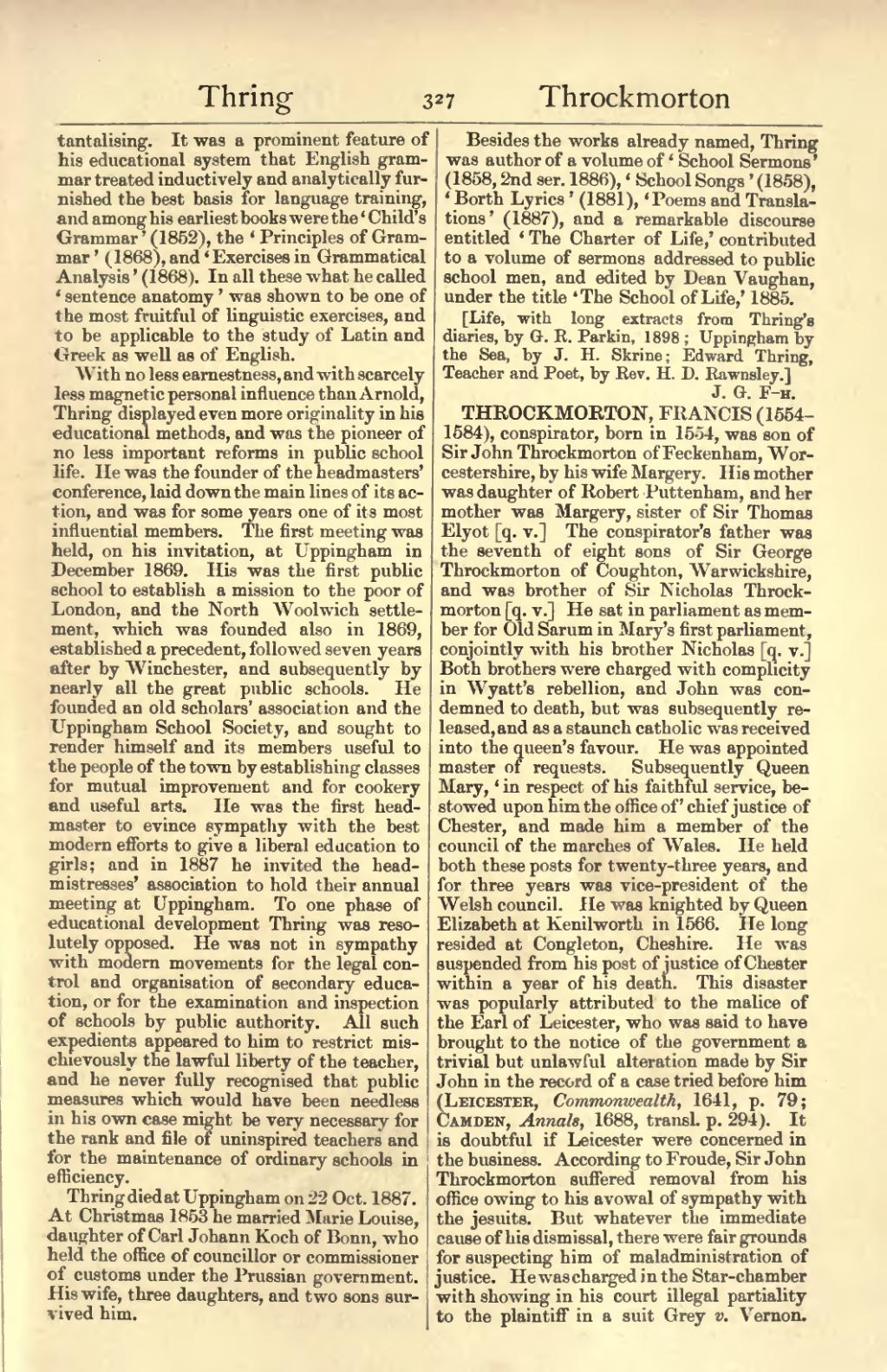tantalising. It was a prominent feature of his educational system that English grammar treated inductively and analytically furnished the best basis for language training, and among his earliest books were the ‘Child's Grammar’ (1852), the ‘Principles of Grammar’ (1868), and ‘Exercises in Grammatical Analysis’ (1868). In all these what he called ‘sentence anatomy’ was shown to be one of the most fruitful of linguistic exercises, and to be applicable to the study of Latin and Greek as well as of English.
With no less earnestness, and with scarcely less magnetic personal influence than Arnold, Thring displayed even more originality in his educational methods, and was the pioneer of no less important reforms in public school life. He was the founder of the headmasters' conference, laid down the main lines of its action, and was for some years one of its most influential members. The first meeting was held, on his invitation, at Uppingham in December 1869. His was the first public school to establish a mission to the poor of London, and the North Woolwich settlement, which was founded also in 1869, established a precedent, followed seven years after by Winchester, and subsequently by nearly all the great public schools. He founded an old scholars' association and the Uppingham School Society, and sought to render himself and its members useful to the people of the town by establishing classes for mutual improvement and for cookery and useful arts. He was the first headmaster to evince sympathy with the best modern efforts to give a liberal education to girls; and in 1887 he invited the headmistresses' association to hold their annual meeting at Uppingham. To one phase of educational development Thring was resolutely opposed. He was not in sympathy with modern movements for the legal control and organisation of secondary education, or for the examination and inspection of schools by public authority. All such expedients appeared to him to restrict mischievously the lawful liberty of the teacher, and he never fully recognised that public measures which would have been needless in his own case might be very necessary for the rank and file of uninspired teachers and for the maintenance of ordinary schools in efficiency.
Thring died at Uppingham on 22 Oct. 1887. At Christmas 1853 he married Marie Louise, daughter of Carl Johann Koch of Bonn, who held the office of councillor or commissioner of customs under the Prussian government. His wife, three daughters, and two sons survived him.
Besides the works already named, Thring was author of a volume of ‘School Sermons’ (1858, 2nd ser. 1886), ‘School Songs’ (1858), ‘Borth Lyrics’ (1881), ‘Poems and Translations’ (1887), and a remarkable discourse entitled ‘The Charter of Life,’ contributed to a volume of sermons addressed to public school men, and edited by Dean Vaughan, under the title ‘The School of Life,’ 1885.
[Life, with long extracts from Thring's diaries, by G. R. Parkin, 1898; Uppingham by the Sea, by J. H. Skrine; Edward Thring, Teacher and Poet, by Rev. H. D. Rawnsley.]
THROCKMORTON, FRANCIS (1554–1584), conspirator, born in 1554, was son of Sir John Throckmorton of Feckenham, Worcestershire, by his wife Margery. His mother was daughter of Robert Puttenham, and her mother was Margery, sister of Sir Thomas Elyot [q. v.] The conspirator's father, Sir John, was seventh of eight sons of Sir George Throckmorton of Coughton, Warwickshire, and was brother of Sir Nicholas Throckmorton [q. v.] He sat in parliament as member for Old Sarum in Mary's first parliament, conjointly with his brother Nicholas. Both brothers were charged with complicity in Wyatt's rebellion, and John was condemned to death, but was subsequently released, and as a staunch catholic was received into the queen's favour. He was appointed master of requests. Subsequently Queen Mary, ‘in respect of his faithful service, bestowed upon him the office of’ chief justice of Chester, and made him a member of the council of the marches of Wales. He held both these posts for twenty-three years, and for three years was vice-president of the Welsh council. He was knighted by Queen Elizabeth at Kenilworth in 1566. He long resided at Congleton, Cheshire. He was suspended from his post of justice of Chester within a year of his death. This disaster was popularly attributed to the malice of the Earl of Leicester, who was said to have brought to the notice of the government a trivial but unlawful alteration made by Sir John in the record of a case tried before him (Leicester, Commonwealth, 1641, p. 79; Camden, Annals, 1688, transl. p. 294). It is doubtful if Leicester were concerned in the business. According to Froude, Sir John Throckmorton suffered removal from his office owing to his avowal of sympathy with the jesuits. But whatever the immediate cause of his dismissal, there were fair grounds for suspecting him of maladministration of justice. He was charged in the Star-chamber with showing in his court illegal partiality to the plaintiff in a suit Grey v. Vernon.
